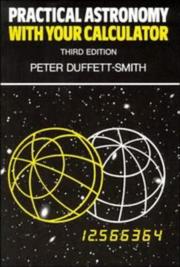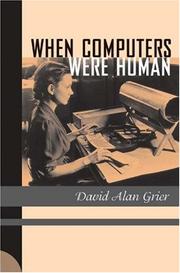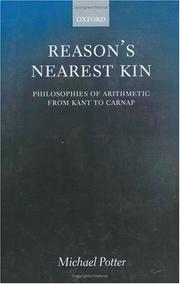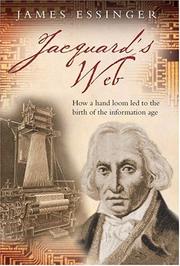| Listing 1 - 10 of 4995 | << page >> |
Sort by
|
Book
ISBN: 9780511861161 9780521146548 9780511860836 0511860838 0511861168 9780511859090 0511859090 0521146542 0511862091 1139895540 0511857357 1283066262 9786613066268 0511859961 0511858221 9780511862090 9781139895545 9780511857355 9781283066266 6613066265 9780511859960 9780511858222 Year: 2011 Publisher: Cambridge : Cambridge University Press,
Abstract | Keywords | Export | Availability | Bookmark
 Loading...
Loading...Choose an application
- Reference Manager
- EndNote
- RefWorks (Direct export to RefWorks)
Now in its fourth edition, this highly regarded book is ideal for those who wish to solve a variety of practical and recreational problems in astronomy using a scientific calculator or spreadsheet. Updated and extended, this new edition shows you how to use spreadsheets to predict, with greater accuracy, solar and lunar eclipses, the positions of the planets, and the times of sunrise and sunset. Suitable for worldwide use, this handbook covers orbits, transformations and general celestial phenomena, and is essential for anyone wanting to make astronomical calculations for themselves. With clear, easy-to-follow instructions for use with a pocket calculator, shown alongside worked examples, it can be enjoyed by anyone interested in astronomy, and will be a useful tool for software writers and students studying introductory astronomy. High-precision spreadsheet methods for greater accuracy are available at www.cambridge.org/practicalastronomy.
Astronomy --- Calculators --- Electronic spreadsheets in education. --- Education

ISBN: 0511251688 1139930060 1139929445 0511337558 0511336942 0511336292 0511338112 0511564899 9780511338113 9780511564895 0521356296 9780521356299 0521356997 9780521356992 9780511251689 9781139930062 9781139929448 9780511337550 9780511336942 9780511336294 Year: 1988 Publisher: Cambridge : Cambridge University Press,
Abstract | Keywords | Export | Availability | Bookmark
 Loading...
Loading...Choose an application
- Reference Manager
- EndNote
- RefWorks (Direct export to RefWorks)
Practical Astronomy with your Calculator, first published in 1979, has enjoyed immense success. The author's clear and easy to follow routines enable you to solve a variety of practical and recreational problems in astronomy using a scientific calculator. Mathematical complexity is kept firmly in the background, leaving just the elements necessary for swiftly making calculations. The major topics are: time, coordinate systems, the Sun, the planetary system, binary stars, the Moon, and eclipses. In the third edition there are entirely new sections on generalised coordinate transformations, nutrition, aberration, and selenographic coordinates. The calculations for sunrise and moonrise are improved. A larger page size has increased the clarity of the presentation. This handbook is essential for anyone who needs to make astronomical calculations. It will be enjoyed by amateur astronomers and appreciated by students studying introductory astronomy. • Clear presentation • Reliable approximations • Covers orbits, transformations, and general celestial phenomena • Can be used anywhere, worldwide • Routines extensively tested by thousands of readers round the world
Astronomy --- Calculators. --- Adding-machines --- Calculating-machines --- Computers, Mechanical --- Desk calculators --- Mathematical machines (Calculators) --- Mechanical computers --- Mathematical instruments --- Office equipment and supplies --- Arithmetic --- Computers --- Tabulating machines

ISBN: 0691091579 1400849365 9781400849369 9780691133829 0691133824 1306046181 9780691091570 Year: 2005 Publisher: Princeton : Princeton University Press,
Abstract | Keywords | Export | Availability | Bookmark
 Loading...
Loading...Choose an application
- Reference Manager
- EndNote
- RefWorks (Direct export to RefWorks)
Before Palm Pilots and iPods, PCs and laptops, the term "computer" referred to the people who did scientific calculations by hand. These workers were neither calculating geniuses nor idiot savants but knowledgeable people who, in other circumstances, might have become scientists in their own right. When Computers Were Human represents the first in-depth account of this little-known, 200-year epoch in the history of science and technology. Beginning with the story of his own grandmother, who was trained as a human computer, David Alan Grier provides a poignant introduction to the wider world of women and men who did the hard computational labor of science. His grandmother's casual remark, "I wish I'd used my calculus," hinted at a career deferred and an education forgotten, a secret life unappreciated; like many highly educated women of her generation, she studied to become a human computer because nothing else would offer her a place in the scientific world. The book begins with the return of Halley's comet in 1758 and the effort of three French astronomers to compute its orbit. It ends four cycles later, with a UNIVAC electronic computer projecting the 1986 orbit. In between, Grier tells us about the surveyors of the French Revolution, describes the calculating machines of Charles Babbage, and guides the reader through the Great Depression to marvel at the giant computing room of the Works Progress Administration. When Computers Were Human is the sad but lyrical story of workers who gladly did the hard labor of research calculation in the hope that they might be part of the scientific community. In the end, they were rewarded by a new electronic machine that took the place and the name of those who were, once, the computers.
Mental calculators --- Science --- Calculus --- Calculating prodigies --- Calculators, Mental --- Computers, Human --- Human computers --- Gifted persons --- Mental arithmetic --- Natural science --- Natural sciences --- Science of science --- Sciences --- History. --- Mathematics

ISBN: 1281944289 9786611944285 0191520225 9780191520228 019825041X 9780199252619 9780198250418 0199252610 Year: 2000 Publisher: Oxford ; New York : Oxford University Press,
Abstract | Keywords | Export | Availability | Bookmark
 Loading...
Loading...Choose an application
- Reference Manager
- EndNote
- RefWorks (Direct export to RefWorks)
Reason's Nearest Kin is a critical examination of the most exciting period there has been in the philosophical study of the properties of the natural numbers, from the 1880s to the 1930s. Reassessing the brilliant innovations of Frege, Russell, Wittgenstein, and others, which transformed philosophy as well as our understanding of mathematics, Michael Potter places arithmetic at the interface between experience, language, thought, and the world.
Arithmetic --- Mathematics --- Logic of mathematics --- Mathematics, Logic of --- Set theory --- Calculators --- Numbers, Real --- Philosophy.
Book
ISBN: 1299444296 1442218762 9781442218765 9781299444294 9781442218741 1442218746 9781442218758 Year: 2013 Publisher: Lanham : Rowman & Littlefield Publishers, Inc.,
Abstract | Keywords | Export | Availability | Bookmark
 Loading...
Loading...Choose an application
- Reference Manager
- EndNote
- RefWorks (Direct export to RefWorks)
Math is a subject many people find intimidating. But many don't understand the history of math and how it came to be what it is today. Here, G. Arnell Williams illuminates, in plain and simple terms, how we got the math we use today, the math our children learn, and the math we struggle at times to explain.
Mathematics --- Arithmetic --- Set theory --- Calculators --- Numbers, Real --- Math --- Science --- Study and teaching (Early childhood) --- Parent participation.
Periodical
Abstract | Keywords | Export | Availability | Bookmark
 Loading...
Loading...Choose an application
- Reference Manager
- EndNote
- RefWorks (Direct export to RefWorks)
Life sciences --- Biology. --- Computers. --- Data processing --- Computer programs --- Computer programs. --- Data processing. --- Calculators, Programmable --- Computer Hardware --- Computers, Digital --- Hardware, Computer --- Calculator, Programmable --- Computer --- Computer, Digital --- Digital Computer --- Digital Computers --- Programmable Calculator --- Programmable Calculators --- Biosciences --- Sciences, Life --- Science --- Biology --- Computers
Periodical
Abstract | Keywords | Export | Availability | Bookmark
 Loading...
Loading...Choose an application
- Reference Manager
- EndNote
- RefWorks (Direct export to RefWorks)
Chemistry --- Chemistry. --- Computers. --- Chimie --- Chemie. --- Data processing --- Informatique --- Data processing. --- Calculators, Programmable --- Computer Hardware --- Computers, Digital --- Hardware, Computer --- Calculator, Programmable --- Computer --- Computer, Digital --- Digital Computer --- Digital Computers --- Programmable Calculator --- Programmable Calculators --- Physical sciences --- Computers --- Chimio-informatique --- Chimie. --- Ordinateurs. --- chemistry. --- computers.

ISBN: 0192805770 1281346543 0191517259 9780191517259 9781281346544 9780192805782 0192805789 9786611346546 6611346546 9780192805775 019150114X Year: 2007 Publisher: Oxford : Oxford University Press,
Abstract | Keywords | Export | Availability | Bookmark
 Loading...
Loading...Choose an application
- Reference Manager
- EndNote
- RefWorks (Direct export to RefWorks)
Jacquard's Web tells one of the greatest untold stories of science: how a hand loom invented in Napoleonic France led to the birth of the modern computer age. James Essinger, a master storyteller, traces the 200-year evolution of Jacquard's idea from the studios of 18th century weavers, through the Industrial Revolution to the development of hi-tech computers and the information age today. - ;Jacquard's Web is the story of some of the most ingenious inventors the world has ever known, a fascinating account of how a hand-loom invented in Napoleonic France led to the development of the modern in
Computing --- Calculators. --- Jacquard knitting machines. --- Information technology --- History. --- Jacquard, Joseph-Marie, --- Adding-machines --- Calculating-machines --- Computers, Mechanical --- Desk calculators --- Mathematical machines (Calculators) --- Mechanical computers --- Jacquard, Charles-Marie, --- Jacquard knitting machines --- Jacquard, Métiers --- Jacquard, Joseph Marie --- Jacquard, Joseph Marie. --- Jacquard, Métiers --- Jacquard, Joseph Marie, --- Knitting machines --- Mathematical instruments --- Office equipment and supplies --- Arithmetic --- Computers --- Tabulating machines --- Ordinateurs --- Technologie de l'information --- Histoire
Book
ISBN: 3030026191 3030026183 Year: 2018 Publisher: Cham : Springer International Publishing : Imprint: Springer,
Abstract | Keywords | Export | Availability | Bookmark
 Loading...
Loading...Choose an application
- Reference Manager
- EndNote
- RefWorks (Direct export to RefWorks)
This encyclopedic reference provides a concise and engaging overview of the groundbreaking inventions and conceptual innovations that have shaped the field of computing, and the technology that runs the modern world. Each alphabetically-ordered entry presents a brief account of a pivotal innovation and the great minds behind it, selected from a wide range of diverse topics. Topics and features: Describes the development of Babbage’s computing machines, Leibniz’s binary arithmetic, Boole’s symbolic logic, and Von Neumann architecture Reviews a range of historical analog and digital computers, significant mainframes and minicomputers, and pioneering home and personal computers Discusses a selection of programming languages and operating systems, along with key concepts in software engineering and commercial computing Examines the invention of the transistor, the integrated circuit, and the microprocessor Relates the history of such developments in personal computing as the mouse, the GUI, Atari video games, and Microsoft Office Surveys innovations in communications, covering mobile phones, WiFi, the Internet and World Wide Web, e-commerce, smartphones, social media, and GPS Presents coverage of topics on artificial intelligence, the ATM, digital photography and digital music, robotics, and Wikipedia Contains self-test quizzes and a helpful glossary This enjoyable compendium will appeal to the general reader curious about the intellectual milestones that led to the digital age, as well as to the student of computer science seeking a primer on the history of their field. Dr. Gerard O'Regan is a CMMI software process improvement consultant with research interests including software quality and software process improvement, mathematical approaches to software quality, and the history of computing. He is the author of such Springer titles as World of Computing, Concise Guide to Formal Methods, Concise Guide to Software Engineering, and Guide to Discrete Mathematics.
Calculators. --- Computers. --- Mathematical instruments. --- Instruments, Mathematical --- Scientific apparatus and instruments --- Automatic computers --- Automatic data processors --- Computer hardware --- Computing machines (Computers) --- Electronic brains --- Electronic calculating-machines --- Electronic computers --- Hardware, Computer --- Computer systems --- Cybernetics --- Machine theory --- Calculators --- Cyberspace --- Adding-machines --- Calculating-machines --- Computers, Mechanical --- Desk calculators --- Mathematical machines (Calculators) --- Mechanical computers --- Mathematical instruments --- Office equipment and supplies --- Arithmetic --- Computers --- Tabulating machines --- Computer science. --- Technology-History. --- Computer hardware. --- History of Computing. --- History of Technology. --- Computer Hardware. --- Personal Computing. --- Informatics --- Science --- Technology—History. --- Personal computers. --- Home computers --- Micro computers --- Micros (Microcomputers) --- PCs (Microcomputers) --- Personal computers --- Small computers --- Minicomputers
Book
ISBN: 0128122307 0128122315 Year: 2017 Publisher: Cambridge, Massachusetts : Academic Press,
Abstract | Keywords | Export | Availability | Bookmark
 Loading...
Loading...Choose an application
- Reference Manager
- EndNote
- RefWorks (Direct export to RefWorks)
Computers. --- Computers --- Automatic computers --- Automatic data processors --- Computer hardware --- Computing machines (Computers) --- Electronic brains --- Electronic calculating-machines --- Electronic computers --- Hardware, Computer --- Computer systems --- Cybernetics --- Machine theory --- Calculators --- Cyberspace
| Listing 1 - 10 of 4995 | << page >> |
Sort by
|

 Search
Search Feedback
Feedback About UniCat
About UniCat  Help
Help News
News